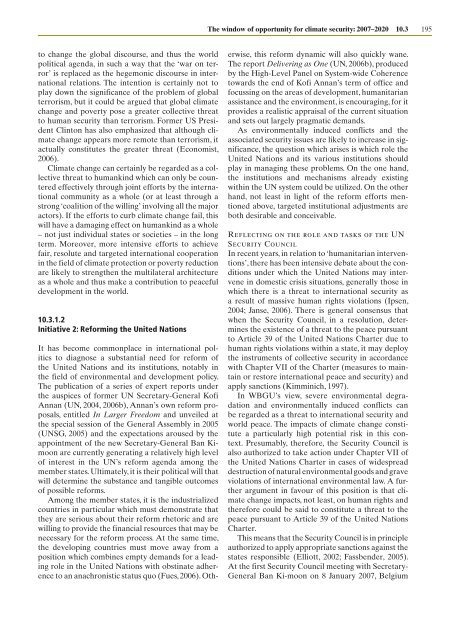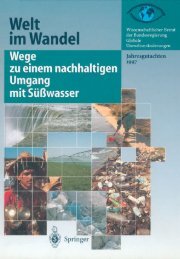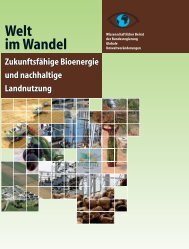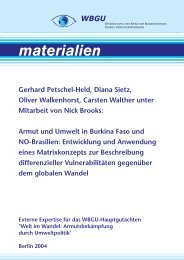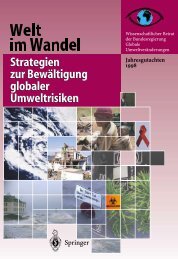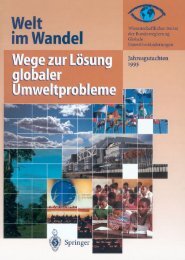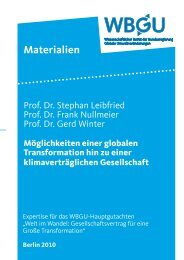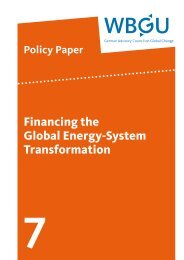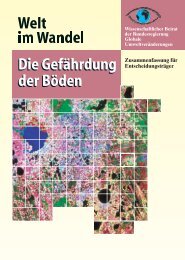World in Transition: Climate Change as a Security Risk - WBGU
World in Transition: Climate Change as a Security Risk - WBGU
World in Transition: Climate Change as a Security Risk - WBGU
Create successful ePaper yourself
Turn your PDF publications into a flip-book with our unique Google optimized e-Paper software.
to change the global discourse, and thus the world<br />
political agenda, <strong>in</strong> such a way that the ‘ war on terror’<br />
is replaced <strong>as</strong> the hegemonic discourse <strong>in</strong> <strong>in</strong>ternational<br />
relations. The <strong>in</strong>tention is certa<strong>in</strong>ly not to<br />
play down the significance of the problem of global<br />
terrorism, but it could be argued that global climate<br />
change and poverty pose a greater collective threat<br />
to human security than terrorism. Former US President<br />
Cl<strong>in</strong>ton h<strong>as</strong> also emph<strong>as</strong>ized that although climate<br />
change appears more remote than terrorism, it<br />
actually constitutes the greater threat (Economist,<br />
2006).<br />
<strong>Climate</strong> change can certa<strong>in</strong>ly be regarded <strong>as</strong> a collective<br />
threat to humank<strong>in</strong>d which can only be countered<br />
effectively through jo<strong>in</strong>t efforts by the <strong>in</strong>ternational<br />
community <strong>as</strong> a whole (or at le<strong>as</strong>t through a<br />
strong ‘ coalition of the will<strong>in</strong>g’ <strong>in</strong>volv<strong>in</strong>g all the major<br />
actors). If the efforts to curb climate change fail, this<br />
will have a damag<strong>in</strong>g effect on humank<strong>in</strong>d <strong>as</strong> a whole<br />
– not just <strong>in</strong>dividual states or societies – <strong>in</strong> the long<br />
term. Moreover, more <strong>in</strong>tensive efforts to achieve<br />
fair, resolute and targeted <strong>in</strong>ternational cooperation<br />
<strong>in</strong> the field of climate protection or poverty reduction<br />
are likely to strengthen the multilateral architecture<br />
<strong>as</strong> a whole and thus make a contribution to peaceful<br />
development <strong>in</strong> the world.<br />
10.3.1.2<br />
Initiative 2: Reform<strong>in</strong>g the United Nations<br />
It h<strong>as</strong> become commonplace <strong>in</strong> <strong>in</strong>ternational politics<br />
to diagnose a substantial need for reform of<br />
the United Nations and its <strong>in</strong>stitutions, notably <strong>in</strong><br />
the field of environmental and development policy.<br />
The publication of a series of expert reports under<br />
the auspices of former UN Secretary-General Kofi<br />
Annan (UN, 2004, 2006b), Annan’s own reform proposals,<br />
entitled In Larger Freedom and unveiled at<br />
the special session of the General Assembly <strong>in</strong> 2005<br />
(UNSG, 2005) and the expectations aroused by the<br />
appo<strong>in</strong>tment of the new Secretary-General Ban Kimoon<br />
are currently generat<strong>in</strong>g a relatively high level<br />
of <strong>in</strong>terest <strong>in</strong> the UN’s reform agenda among the<br />
member states. Ultimately, it is their political will that<br />
will determ<strong>in</strong>e the substance and tangible outcomes<br />
of possible reforms.<br />
Among the member states, it is the <strong>in</strong>dustrialized<br />
countries <strong>in</strong> particular which must demonstrate that<br />
they are serious about their reform rhetoric and are<br />
will<strong>in</strong>g to provide the f<strong>in</strong>ancial resources that may be<br />
necessary for the reform process. At the same time,<br />
the develop<strong>in</strong>g countries must move away from a<br />
position which comb<strong>in</strong>es empty demands for a lead<strong>in</strong>g<br />
role <strong>in</strong> the United Nations with obst<strong>in</strong>ate adherence<br />
to an anachronistic status quo (Fues, 2006). Oth-<br />
The w<strong>in</strong>dow of opportunity for climate security: 2007–2020 10.3<br />
erwise, this reform dynamic will also quickly wane.<br />
The report Deliver<strong>in</strong>g <strong>as</strong> One (UN, 2006b), produced<br />
by the High-Level Panel on System-wide Coherence<br />
towards the end of Kofi Annan’s term of office and<br />
focuss<strong>in</strong>g on the are<strong>as</strong> of development, humanitarian<br />
<strong>as</strong>sistance and the environment, is encourag<strong>in</strong>g, for it<br />
provides a realistic appraisal of the current situation<br />
and sets out largely pragmatic demands.<br />
As environmentally <strong>in</strong>duced conflicts and the<br />
<strong>as</strong>sociated security issues are likely to <strong>in</strong>cre<strong>as</strong>e <strong>in</strong> significance,<br />
the question which arises is which role the<br />
United Nations and its various <strong>in</strong>stitutions should<br />
play <strong>in</strong> manag<strong>in</strong>g these problems. On the one hand,<br />
the <strong>in</strong>stitutions and mechanisms already exist<strong>in</strong>g<br />
with<strong>in</strong> the UN system could be utilized. On the other<br />
hand, not le<strong>as</strong>t <strong>in</strong> light of the reform efforts mentioned<br />
above, targeted <strong>in</strong>stitutional adjustments are<br />
both desirable and conceivable.<br />
Reflect<strong>in</strong>g on the role and t<strong>as</strong>ks of the UN<br />
<strong>Security</strong> Council<br />
In recent years, <strong>in</strong> relation to ‘humanitarian <strong>in</strong>terventions’,<br />
there h<strong>as</strong> been <strong>in</strong>tensive debate about the conditions<br />
under which the United Nations may <strong>in</strong>tervene<br />
<strong>in</strong> domestic crisis situations, generally those <strong>in</strong><br />
which there is a threat to <strong>in</strong>ternational security <strong>as</strong><br />
a result of m<strong>as</strong>sive human rights violations (Ipsen,<br />
2004; Janse, 2006). There is general consensus that<br />
when the <strong>Security</strong> Council, <strong>in</strong> a resolution, determ<strong>in</strong>es<br />
the existence of a threat to the peace pursuant<br />
to Article 39 of the United Nations Charter due to<br />
human rights violations with<strong>in</strong> a state, it may deploy<br />
the <strong>in</strong>struments of collective security <strong>in</strong> accordance<br />
with Chapter VII of the Charter (me<strong>as</strong>ures to ma<strong>in</strong>ta<strong>in</strong><br />
or restore <strong>in</strong>ternational peace and security) and<br />
apply sanctions (Kimm<strong>in</strong>ich, 1997).<br />
In <strong>WBGU</strong>’s view, severe environmental degradation<br />
and environmentally <strong>in</strong>duced conflicts can<br />
be regarded <strong>as</strong> a threat to <strong>in</strong>ternational security and<br />
world peace. The impacts of climate change constitute<br />
a particularly high potential risk <strong>in</strong> this context.<br />
Presumably, therefore, the <strong>Security</strong> Council is<br />
also authorized to take action under Chapter VII of<br />
the United Nations Charter <strong>in</strong> c<strong>as</strong>es of widespread<br />
destruction of natural environmental goods and grave<br />
violations of <strong>in</strong>ternational environmental law. A further<br />
argument <strong>in</strong> favour of this position is that climate<br />
change impacts, not le<strong>as</strong>t, on human rights and<br />
therefore could be said to constitute a threat to the<br />
peace pursuant to Article 39 of the United Nations<br />
Charter.<br />
This means that the <strong>Security</strong> Council is <strong>in</strong> pr<strong>in</strong>ciple<br />
authorized to apply appropriate sanctions aga<strong>in</strong>st the<br />
states responsible (Elliott, 2002; F<strong>as</strong>sbender, 2005).<br />
At the first <strong>Security</strong> Council meet<strong>in</strong>g with Secretary-<br />
General Ban Ki-moon on 8 January 2007, Belgium<br />
195


